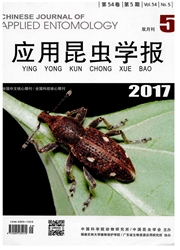

 中文摘要:
中文摘要:
寄生蜂作为天敌昆虫,在害虫生物防治中起着极其重要的作用。现代分子生物学和第二代测序技术的迅速发展,为筛选寄生蜂与寄主免疫互作的关键分子,阐明寄生蜂逃避或抑制寄主免疫系统攻击的机理提供了新的机遇。昆虫的天然免疫可分为细胞免疫和体液免疫,寄生蜂在与寄主长期的协同进化过程中,依靠毒液(venom)、多分DNA病毒(PDV)、类病毒颗粒(VLP)、畸形细胞(teratocyte)等手段,一方面调控寄主血细胞的增殖和分化,抑制细胞包囊反应,从而破坏寄主的细胞免疫系统;另一方面,通过抑制酚氧化酶原激活干扰寄主的体液免疫,从而逃避黑化反应的攻击。寄生蜂在发育过程中也有相应的免疫防御机制。本文从细胞免疫、体液黑化反应以及免疫信号通路等方面,综述了近年来利用组学手段在寄生蜂调控寄主免疫方面取得的最新进展,以期为阐明天然免疫的分子机制、探索害虫防治新方法提供借鉴。
 英文摘要:
英文摘要:
Parasitoid wasps, as natural enemies of agricultural pests, play important roles in biological pest control. To date, many studies have focused on identifying key molecules involved in parasitoidhost interactions. Insects have a potent innate immune system, comprising cellular immunity and humoral immunity. Parasitoid wasps have evolved ways to evade or suppress these host defenses with venom proteins, polydnavirus (PDV), viruslike particles (VLP), teratocytes and other virulent factors. The invasion of parasitoids reduces the total hemocyte count and suppresses hemocyte differentiation. Encapsulation, an important cellular immune response, can be inhibited by Rho family factors and calreticulin from parasitoid venom. Parasitoids evade host humoral immunity by interfering with Toll and IMD immune signaling pathways. Additionally, host melanization is strongly inhibited by virulent factors. Through this review of the current literature, we hope to provide new information on molecular aspects of parasitoidhost interactions, which may lead to novel approaches for pest management.
 同期刊论文项目
同期刊论文项目
 同项目期刊论文
同项目期刊论文
 期刊信息
期刊信息
